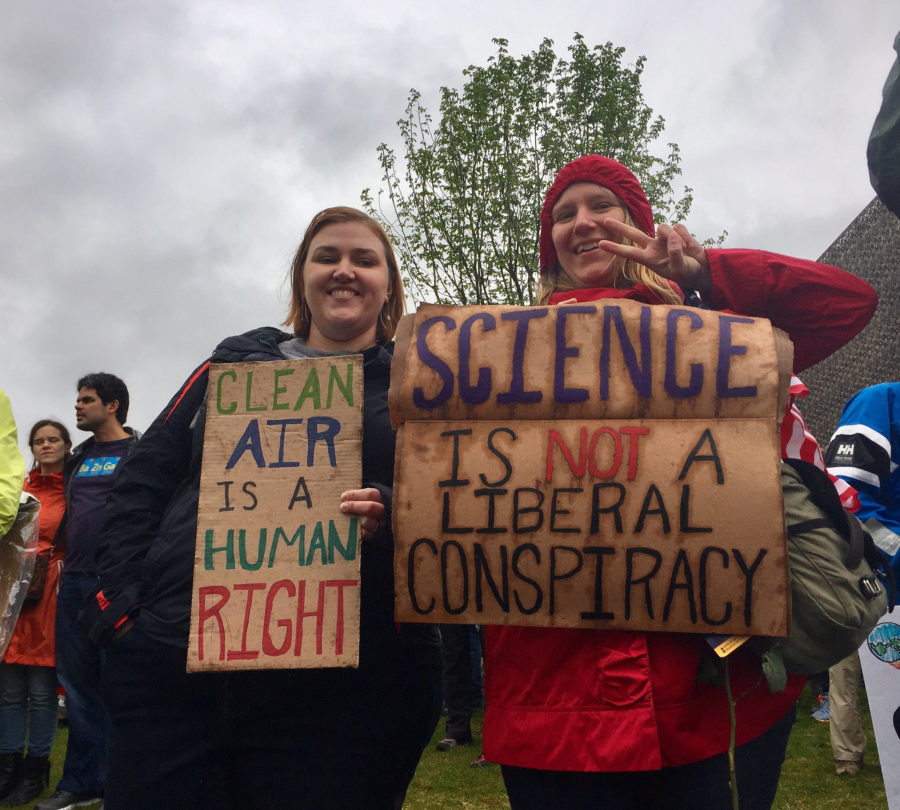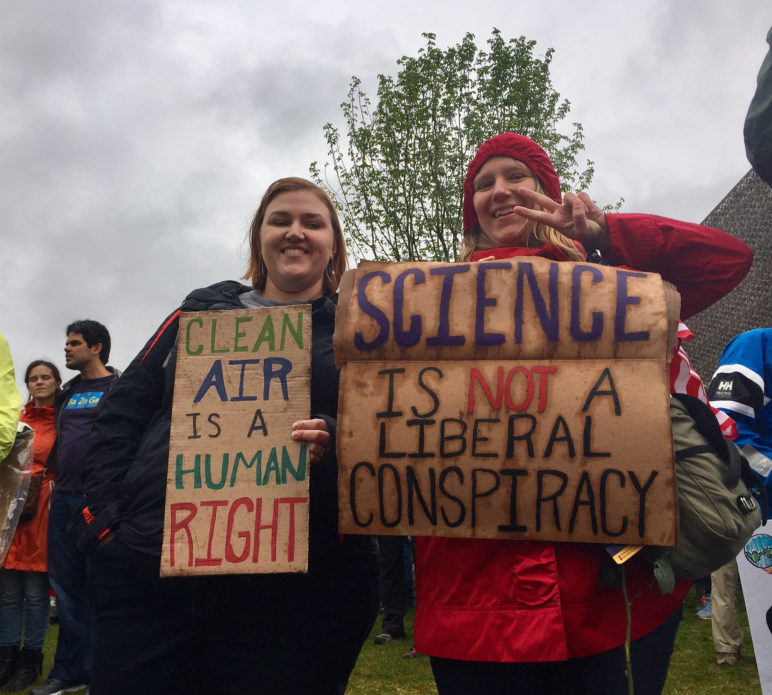Raise your hand if you think talking about climate change is a risky move on the campaign trail in 2018 midterms.
Okay, now put your hands down.
Recent polling makes climate change look more like a wedge issue than a hot potato—especially for younger and Latino voters.
Polling shows that US voters not only understand climate science, but more and more are increasingly worried about it—including hefty shares of moderate Republicans and Independents. Yes, it appears conservative US voters lag behind, but their attitudes are looking more like outliers. There’s also strong bipartisan support for a range of policies to address climate change and voters support a stronger Environmental Protection Agency—even Trump backers.
And climate change is a particular focus for millennial and Latino voters.
A Pew Research Center study confirms that millennial generation voters—ages 22 to 37 this election season—are considerably more liberal than older Americans. What’s more, that group now represents 28 percent of the US adult population. These voters are considerably more likely to support climate action and the Congressional candidates who talk them up. According to Pew: “these young people are poised to have an outsized impact on political races—this year and subsequently.” (See also: Ten US congressional districts where millennial voters could decide who wins this November.)
Pew notes that millennials are more than 40 percent nonwhite—the highest share of any adult generation—while millennials’ parents and grandparents are more like 79 percent white.
Racial demographics in general are a factor in the electoral equation. Latinos are now the largest non-white racial group in America and they’re the second-fastest growing population after Asian Americans. There are 57.5 million Latinos in the US according to the most recent US Census estimates.
“This group is more than large enough to transform the political balance of power in key states and in the country as a whole,” author Steve Philips wrote in an article for The Nation.” Most immediately, Latinos now have the numbers to swing key races that will determine control of the United States Senate.” It’s not inconsequential that all kinds of opinion research—and I mean poll after poll reveals strong environmental values among Latino voters, including support for aggressive action to address global warming.
85 percent of African Americans supported global commitments on climate.
African American voters’ attitudes on climate change haven’t been measured as fully, and neither have Asian American or Native American attitudes. What’s available tends to show green values among people of color. A 2014 Green For All poll showed that minority voters are more supportive of candidates willing to give resources to fight climate change than those who do not. I wrote about polling showing Asian Americans’ strong environmental attitudes a few years back. A 2015 Benenson Strategy Group poll found that 85 percent of African Americans supported global commitments on climate. And from the same year, a Green for All and Natural Resources Defense Council survey found that African-American voters were out ahead of white voters in both their concern about the problem and their backing for climate solutions. This is confirmed by more recent EcoAmerica metrics from 2017.
But in the racially-charged politics of 2018 and with the weight of lots of pressing economic and cultural issues bearing down on voters, it would be a mistake for candidates to take these climate positions—or any one bloc of voters—for granted.
Of course attitudes are one thing, actions are another. Notably, EcoAmerica’s 2017 survey showed many voters under 30 (44 percent), Black voters (45 percent), and strong Democrats (51 percent) said they contacted or voted for an elected official based on support for taking action on climate change.
Here in Cascadia, real votes in 2017 may be an encouraging bellwether too. In Washington State, Think Progress pointed to two candidates who ran on explicitly environmental platforms and won important swing-seats despite the fossil fuel industry spending over a million dollars to beat them.
Add it all up and climate looks a lot more like a winner than a loser.
So, add it all up and climate looks a lot more like a winner than a loser. While climate change might not be the top reason for choosing one candidate over another in the 2018 midterms, it is part of a compelling package.
See for yourself. Here’s a snapshot of recent public opinion polling:
- Most voters share significant climate concern. African Americans showed a higher level of climate concern than any other group in a 2017 survey by EcoAmerica: 91 percent, up 16 points from 2015. In the same survey, 90 percent of Latino voters said they are concerned—up 7 points since 2015—compared to 69 percent of whites. More recently, Yale Program on Climate Change Communication found that a majority of US voters are worried about global warming, including 88 percent of liberal Democrats, 76 percent of moderate/conservative Democrats, and 58 percent of liberal/moderate Republicans—but only 30 percent of conservative Republicans. In EcoAmerica’s research, 86 percent of Americans under 30 said they were concerned about global warming.
- Voters “get” the science, including humans’ role. Pew reports three-quarters of the public agree there’s “solid evidence” of global warming, and 53 percent attribute it to human activity. But among millennials, 81 percent say there’s evidence, and 65 percent primarily blame human activity. Yale found that more than eight in ten US Latinos (84 percent) say global warming is happening. EcoAmerica reports 94 percent. And 70 percent of US Latinos understand global warming is mostly human caused. For Democratic millennials, it’s nearly unanimous: 94 percent acknowledge global warming, and 87 percent say human activity is to blame. Republican millennials outpace their older counterparts on this question: 57 percent believe there is solid evidence, though only 29 percent believe that human activity is primarily responsible.
- Most voters want to address global warming. Eighty-eight percent of Latino voters and 82 percent of Black voters and white voters say we have a moral responsibility to address climate change. Yale found that 73 percent of Latino voters in the US want Congress to do more to address global warming. Most voters also think the US should reduce its greenhouse gas emissions “regardless of what other countries do,” including 68 percent of Latinos, 91 percent of liberal Democrats, 77 percent of moderate Democrats, 63 percent of liberal/moderate Republicans, and fully 46 percent of conservative Republicans. And they found that a majority of registered voters (54 percent) think global warming should be a high or very high priority for the president and Congress, including a majority of Democrats (78 percent) and Independents (58 percent)—but Republicans split off starkly here (25 percent). EcoAmerica finds that 77 percent of voters say we should “act collectively to reduce climate pollution,” with 76 percent saying we can do it.
- Voters claim to support specific emissions-cutting policies. EcoAmerica’s 2017 survey found that 88 percent of African American, 82 percent of Latino, and 81 percent of white voters support charging corporate polluters. Yale found that hefty majorities support regulating carbon dioxide as a pollutant—including 80 percent of Independents, and 69 percent of Republicans. Eight in ten Latino voters (81 percent) support requiring fossil fuel companies to pay a carbon tax as do 84 percent of Democrats, 68 percent of Independents, and 56 percent of Republicans (a seven-point increase for Republicans since October 2017). In addition, Yale found that 73 percent of registered voters support setting strict carbon dioxide emission limits on existing coal-fired power plants,” including 87 of Democrats, 70 percent of Independents, 69 percent liberal/moderate Republicans, and 47 percent of conservative Republicans. But Republicans across generations—even millennials—are skeptical or dismissive of climate solutions’ effectiveness.
- Americans of all stripes want more renewable energy and fewer fossil fuels. According to Yale, solid majorities say the US should use more solar energy (80 percent of registered voters, 84 percent of Democrats, 80 percent of Independents, and 75 percent of Republicans) and wind energy (73 percent of registered voters, 82 percent of Democrats, 75 percent of Independents, and 62 percent of Republicans). Holdouts who think we should use more coal are dwindling: 12 percent of registered voters; 6 percent of Democrats, 14 percent of Independents, and 18 percent of Republicans; and only 11 percent of registered voters feel that way about using more oil, including 7 percent of Democrats, and 16 percent of both Independents and Republicans. And Pew Research reports that millennials are less inclined than older generations in the GOP to support increased use of fossil fuel energy sources such as offshore drilling, coal mining, and hydraulic fracturing. For example, 44 percent of millennial Republicans support the increased use of offshore drilling, compared with 75 percent of Republicans in the Baby Boomer and older generations. Bigger partisan divides emerge around domestic energy production. Republicans are more likely than Democrats or Independents to support drilling, mining, and fossil fuel exploration in places like ANWR. EcoAmerica found that Latino voters and voters under 30 are most likely to see the economic benefit of climate solutions, with Latino voters jumping 12 points from 2015 to 2017 to 76 percent on that score and younger voters jumping a whopping 20 points since 2015 to 77 percent (compared to 64 percent of all voters).











John Sandvig
Climate change did not used to be a partisan issue but it has become a key indicator of one’s partisan tribe. As Van Boven and Sherman found in their 2014 and 2016 surveys, people orient strongly to members of their own group. ” In their desire to be upstanding members of their political tribe, people are pulled toward embracing the stances of their peers and loath to publicly disagree with them.” (ref: https://www.nytimes.com/2018/07/28/opinion/sunday/republicans-climate-change.html) Climate has become so politically polarized it now swamps the demographic and other factors mentioned in this piece. However, we have the opportunity to turn climate from the wedge issue character it now possesses to a bridge issue by offering solutions that appeal across the broad political spectrum. A revenue-neutral fee on fossil fuel and other GHGs that returns revenue to US households is such an approach. This idea works because it protects less advantaged Americans (NOT a regressive carbon tax) while creating many, many new jobs and encouraging individual choice, innovation and entrepreneurship and dramatically reducing emissions and, oh yeah!, saving tens of thousand of lives each year.